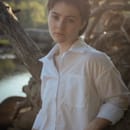Fans were shocked to hear at the “Be the Cowboy” tour in Central Park in 2019 that Mitski Miyawaki was ready to find another life and stop releasing music. But that wasn’t entirely true.
After not publishing music for almost three years, Mitski’s newest album “Laurel Hill” did not disappoint fans: once COVID-19 hit globally, Mitski reconsidered leaving her once successful career.
With a runtime of a little over thirty minutes, the Japanese-American singer-songwriter released “Working for the Knife” in 2019 after her decision to deactivate her social media accounts. Unfortunately, her record label then required her to release one last album, but for fans, this was exceptional news.
Lyrics such as “I used to think I’d be done at twenty/now at twenty-nine, the road still appears the same.” This, in speculation, could be in reference to mental illness, youthfulness or even her career. The song itself was able to embody the metaphor of the “knife,” whether it be working, living, dying and mourning the future to come, according to Genius. This song was a very interesting choice to be the first one she released as a preview for the album. It is apparent she feels overworked as the song’s ambient, heavy instrumental track could back this theory.
Her first song in the discography “Valentine, Texas” is about a small town that lives in Texas called Valentine after it was founded on Valentine’s Day in 1882. Her opening lyrics “Let’s step carefully into the dark/once we’re in, I’ll remember my way around” could be another lyric that alludes to her coming back into the music industry after saying she was ready to leave.
The soul-crushing song’s beautiful imagery allows for us as listeners to picture this place she is mentioning. The last line of the song “let me watch those mountains from underneath/and maybe they’ll finally float off of me” makes the mountains feel as if they could be a burden she leaves on her shoulders.
In comparison to her last album “Be the Cowboy,” her reputation of pleasing yet aching lyrics continue to be strong within this album. Just like a majority of her songs, they begin pleasant-sounding and seem to stir and erupt towards the middle of the piece, an interesting yet captivating choice that allows her listeners to continue wanting more.
A lot of her tracks on this album feel that they could directly relate to her return to the music industry. The album itself feels very personal to the listener, especially in her most recent experiences with fame and fortune.
Track five, and my personal favorite “Heat Lightning,” was Mitski’s third song to be featured with “The Only Heartbreaker” and “Working for the Knife.”
“Heat Lightning” revolves around her anxieties overtaking her in the early hours of the morning and how this feeling can be.
The repetition of the lyrics towards the end, “there’s nothing I can do/not much I can change/I give it up to you/I surrender,” especially on a decrescendo within the music alludes to this feeling of the anxiety sinking in.
“I needed songs that could help me forgive both others and myself,” Mitski said to NME. “I needed to create this space mostly for myself where I sat in that gray area.”
Although the album itself is full of upbeat yet heartbreaking music, Mitski made clear that she wanted to create something that almost served as a “pep talk,” according to NME.
On Pitchfork, the album received a ranking of a 7.8, an exceptionally good review considering the honest yet brutal criticism the website offers.
The album as a whole is exceptionally good, but at times lacks instrumental value. Mitski’s deeply rooted lyrics, however, seem to make up for the areas that it does lack. The way that it embodies her personal experiences so clearly is what makes “Laurel Hill” so captivating.


